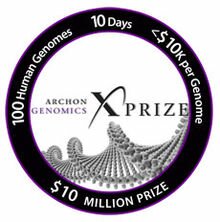 Genome sequencing provider Complete Genomics has announced a deal with the non-profit Inova Translational Medicine Institute, under which the company would sequence 1,500 complete human genomes to help explore the genetic basis of premature birth.
Genome sequencing provider Complete Genomics has announced a deal with the non-profit Inova Translational Medicine Institute, under which the company would sequence 1,500 complete human genomes to help explore the genetic basis of premature birth.
The Inova collaboration is one of many large-scale genome sequencing studies currently being planned and performed around the world. In some respects the study is actually quite a small one – only 250 “cases” (i.e. premature babies) are being sequenced, along with 250 normal-term control babies, which means the researchers will have low statistical power by the standards of modern genomics. However, sequencing this number of complete genomes to high depth is (as far as I know) unprecedented, and the inclusion of the parents of all of the children in the study will provide the team with the ability to do some very interesting analyses – for instance, looking at “de novo” mutations that arise in the babies but weren’t present in either parent, as well as exploring potential effects of the maternal genome. Maternal genetics are known to be important in determining the risk of premature birth: girls born prematurely have a higher risk of delivering a pre-term baby themselves (with twin studies suggesting between 15 and 40% of the risk is heritable), while paternal genes seem to have almost no effect.
Continue reading ‘Complete Genomics to sequence 1500 whole genomes for pre-term birth study’

 To celebrate 10 years since the back-to-back publications of complete human genomes in Science and Nature, Science has published series of articles looking back at the last 10 years of genomics, and forward to the future. The article contains short essays from Francis Collins and Craig Venter, the former talking about some of the successes of medical sequencing (including giving a name and photograph to the exome-sequenced IBD patient I
To celebrate 10 years since the back-to-back publications of complete human genomes in Science and Nature, Science has published series of articles looking back at the last 10 years of genomics, and forward to the future. The article contains short essays from Francis Collins and Craig Venter, the former talking about some of the successes of medical sequencing (including giving a name and photograph to the exome-sequenced IBD patient I  Of particular interest is an article by Eliot Marshall on why genomics hasn’t yet had a large effect on medical practice, and what needs to be done to allow the genomic revolution to trickle into medical care. He argues that scientists and doctors need to meet each other half way; scientists need to focus more on showing the direct clinical utility of genomics, whereas doctors need to be more ready to accept new technologies and discoveries, and adapt the way they practice medicine to make full use of them. [LJ]
Of particular interest is an article by Eliot Marshall on why genomics hasn’t yet had a large effect on medical practice, and what needs to be done to allow the genomic revolution to trickle into medical care. He argues that scientists and doctors need to meet each other half way; scientists need to focus more on showing the direct clinical utility of genomics, whereas doctors need to be more ready to accept new technologies and discoveries, and adapt the way they practice medicine to make full use of them. [LJ] RSS
RSS Twitter
Twitter
Recent Comments